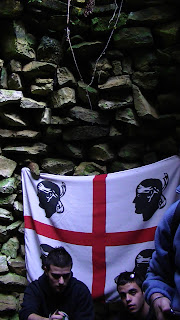Anni fa sono stato in Bulgaria con gli studenti della mia scuola, all’interno della quale avevo costituito una compagnia teatrale. Dovevamo rappresentare la mia commedia musicale “S’Urtima Jana” , di ambientazione Shardana e Nuragica (in pratica ha costituito l’antefatto letterario su cui si basa il mio romanzo “I Thirsenoisin” ).
Ebbene, la Bulgaria mi
ha riservato una grande e piacevole sorpresa, Ancora adesso, a distanza di
anni, mi sembra incredibile l’aver vissuto quella stupenda avventura.
Mai e poi mai avrei
immaginato quanto siano veramente vicini i sardi e i bulgari, due popoli
che appartengono alla grande famiglia della Mater Mediterranea, insieme agli etruschi, ai greci, ai corsi, ai
catalani, ai liguri, ai coloni della Magna Grecia e a tutti gli altri che qui
non posso elencare per intero.
E’ difficile
ricostruire i flussi migratori che nei millenni hanno interessato i tanti
popoli europei che ora vivono sotto diverse bandiere.
La storia, quella dei
libri, la scrivono i vincitori, ha detto qualcuno; ed è vero; e ricostruirla,
se ci accontentiamo della versione ufficiale delle fonti, in fondo è abbastanza
facile.
Più difficile è
ricostruire la preistoria; difficile, ma non impossibile.
Ci stanno provando in
tanti a farlo: scrittori, geologi, antropologhi, i sociologi, archeologhi; tra questi ultimi, a Sofia, ho
conosciuto la prof.ssa Dimitrina Mitova Gionova che ha scoperto a Garlo ( a 50 km dalla capitale bulgara)
un pozzo sacro protosardo.
E’ stato emozionante
visitarlo; per un lungo istante, mentre scendevamo gli scalini in pietra,
ricoperti di muschio, che dal dromos conducono al pozzo, l’emozione ha avvolto
la nostra comitiva in un velo di commozione senza tempo; io ho sentito nel mio
animo che le mie radici affondavano sino a lì.
Con Francesco Fronteddu,
del coro Santa Maria di Orosei, abbiamo intonato dei canti in lingua sarda.
Avevo la pelle d’oca per la grande
emozione.
La sera della
conferenza la archeologa ha detto di essere una bulgara che si sente sarda; io,
la sera successiva, dopo la rappresentazione teatrale, ho dichiarato di essere
un sardo che, almeno per qualche giorno, si è sentito molto bulgaro.
Il
pozzo è risalente al XIV sec. a.c.
a 50 km da Sofia, nel paese di Garlo, molto simile per misure e tipologia a
quelli di Ballao e di Settimo San Pietro, in Sardegna.
Il sito, di notevole
interesse può essere visitato con l’ausilio di guide specializzate. La stessa
archeologa, che è stata in Sardegna nel 1982, per studiare i vari pozzi
sacri sardi e la cultura nuragica, ha scritto interessanti libri, riuscendo a
dare alcune spiegazioni “non classiche “ sull’origine dei Sardi e dei nuragici
in genere, fino allo studio e la comparazione dei bronzetti nuragici con alcuni
testi del vecchio testamento e interessandosi dei kukeri ( che in pratica sono dei mamuthones sardi).
E’ sufficiente confrontare le immagini dei Kukeri bulgari con quelle dei Mamuthones sardi per capire. Anche i loro fanno delle danze e dei giochi particolari per far suonare i campanacci che hanno sulle loro spalle. Secondo la Professoressa Dimitrina Mitova-Dzonova ( “Origine e natura dei pozzi sacri protosardi- III-I millennio A.C.” edito nel 2006 da IVRAI Sofia/Cagliari) i kukeri hanno origine dagli antichi culti dionisiaci.
La mia mente va ai
tanti scrittori in continua rotta con
gli storici canonici per riaffermare le peculiarità della storia sarda
(qualcuno li ha chiamati archeo-punici, cattedratici imbalsamati che hanno
impostato i loro studi soltanto sulle fonti scritte). Mi viene in mente anche Cicitu
Masala, il grande poeta e scrittore della sardità misconosciuta e maltrattata
dagli storici romani (i vincitori) a danno di noi Sardi (i vinti), il popolo
dalla lingua tagliata.
Non mi dispiace vedere dei Sardi che finalmente
non hanno paura di mettere in discussione delle verità che, come diceva Cicitu Masala, sono state scritte dai
vincitori contro noi vinti.
E che finalmente, per
dirla sempre parafrasando il grande poeta e scrittore Cicitu, “ci sta
ricrescendo la lingua che ci hanno tagliato secoli fa, a noi Sardi.”
Questo è uno dei tanti motivi
per cui ho pubblicato I Thirsenoisin,
il mio romanzo di ambientazione Shardana
e Nuragica.
In esso do sfogo alla
mia fantasia, immaginando che i Shardana siano sopravvenuti in Sardegna, quando
la civiltà nuragica si era già affermata; successivamente le due civiltà si
sono fuse, dando luogo al popolo dei Thirsenoisin,
il popolo delle torri.
Chi volesse leggere alcuni brani può andare nel mio blog,
cliccando sul link https://albixpoeti.blogspot.com/2020/11/la-costante-resistenziale-sarda.html
(all’interno del blog si ha anche la possibilità di leggere il libro per
intero).

